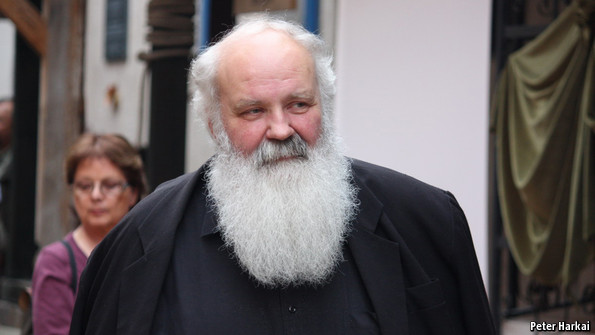A slippery Magyar slope
Religious freedom and central Europe

Sep 25th 2014, 11:07 by B.C.
RESTRICTIONS on religious freedom do not necessarily involve draconian actions like imprisoning pastors, flogging alleged "blasphemers" or bulldozing places of worship. Liberty of faith can be curbed in much milder ways, and it is still something that needs careful watching. To take one example, the Hungarian government has been taken by task by the American State Department, by its own constitutional court, and mostly recently by the European Court on Human Rights (ECHR) over a religion law which makes the status of churches subject to political caprice.
The story starts in 2011 with the passage of an ill-named law on “the Right to Freedom of Conscience and Religion, and on the Legal Status of Churches, Religious Denominations and Religious Communities.” As Aaron Rhodes, a religious freedom campaigner, put it, this replaced a fair system (creating a level playing field for all faiths) with a bad one. The law stopped treating religious communities equally and brought in a tiered system that distinguishes between so-called incorporated churches, which enjoy many legal advantages, and less fortunate religious groups with fewer entitlements.
The troubling thing was that getting recognition as an "incorporated church” required a two-thirds majority in Parliament. So what should be a simple administrative decision was turned into a political one, in which legislators have to assess the merits of a religion. The government insisted that the law was necessary to stop opportunistic cults or "business churches" from establishing themselves with no other aim but taking advantage of the favourable tax regime that religious groups enjoy. But critics said the legislation amounted to killing a fly with a sledge-hammer.
As a result of the law, at least 200 religious communities, including Methodists, Pentecostalists, Seventh Day Adventists, Reform Jews, Buddhists and Hindus faced a downgrading of their status. One of the people who fell foul of the law was Gabor Ivanyi (pictured above), who runs a highly respected Methodist church as well as schools and homeless shelters. His church was closed by the communist authorities in 1977, but he surprised to find himself in legal no-man's-land under a democratic government.
http://www.economist.com/blogs/erasmus/2014/09/religious-freedom-and-central-europe
